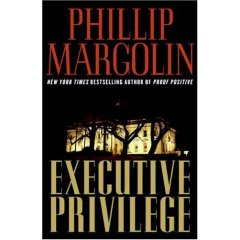 In my quest to hear how experienced novelists do it, I arrived along with many fans to listen to Phillip Margolin talk about his latest novel, Executive Privilege. I was curious about him because way-back-when I worked for the publishing company that first landed him on the bestseller lists. I remember the buzz that went around the editorial offices about Gone, But Not Forgotten. He was the “it” author that season.
In my quest to hear how experienced novelists do it, I arrived along with many fans to listen to Phillip Margolin talk about his latest novel, Executive Privilege. I was curious about him because way-back-when I worked for the publishing company that first landed him on the bestseller lists. I remember the buzz that went around the editorial offices about Gone, But Not Forgotten. He was the “it” author that season.
Highlights from his talk:
1. Advice to writers: Don’t rush the writing on your good story idea lest you peter out prematurely, get dejected, and subsequently set aside what is actually a solid premise. He sometimes develops his plots over years. For example, the premise for Executive Privilege came to him in the early 1990s. (The premise: Can a U.S. president be a serial killer? Hmm…I had a few thoughts on this!)
2. Initial novel ideas: His often revolve around a moral dilemma. For example, Margolin was formerly a criminal defense attorney, and one day he got to thinking about whether there existed a criminal so morally repugnant that he would refuse to defend him, only to have to anyhow. This is Gone, But Not Forgotten.
3. From idea to initial plot ideas: Sometimes, on the other hand, his initial ideas aren’t so deep. His example centered around the image that came into his head upon watching a couple making out on a beach (on t.v.). He imagined a guy in SCUBA gear pulling the woman beneath the waves to kill her. (Gotta love his macabre imagination.)
First, he asks himself the journalistic basics–who, what, where, when, why, how–until he arrives at an interesting scenario that lends itself to conflict. Who is the man? (Judge) Who is the woman? (His mistress) Where are they? (Island paradise) Why? (Privacy) As far as the underwater killer goes: Why would the murderer kill someone in such a convoluted manner anyhow? Then, what does the judge do about his politically disastrous situation? Does he become the main suspect? And so on.
4. Plotting: Margolin is an outliner. He spends months on them, and they can be up to 60 pages long. I asked him whether his stories ever drifted from his outlines. Yep, indeedy. Sometimes the changes come while he’s writing, sometimes as a result of the editorial process.
5. Relationship with publishing house: From what he said, it doesn’t sound like his publisher intrudes too much on his process. Yet, the sales force may suggest title changes. The Courtyard Athletic Club became Ties That Bind, for example.
Or, his editor may point out weaknesses in his manuscript (as all good editors should). He mentioned the case of Proof Positive, in which his original draft contained a point-of-view character in the first chapter that didn’t appear again (yikes!). He was flummoxed as to how to integrate this character into the rest of the novel until an assistant had a bright idea. He then spent eight hours a day for two weeks re-fashioning the novel.
6. Last but not least: My favorite quote of the evening, overheard before Margolin arrived: “I came because I heard rumors that he’s dating my ex-wife.” Now there’s a potential story!




